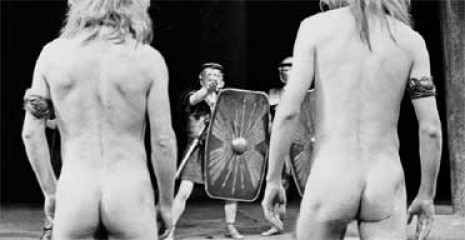
Thirty years ago this month, a new play opened in London’s National Theater that was to change legal and theatrical history. Howard Brenton’s The Romans in Britain contrasted Julius Caesar’s Roman invasion of Celtic Britain with the Saxon invasion of Romano-Celtic Britain, and finally Britain’s involvement in Northern Ireland during The Troubles of the late 20th century. Epic in scale, Brenton’s intelligent analysis of the effects of imperialism was sidelined when The Romans in Britain became center of a farcical court trial over a simulated act of buggery.
The son of a Methodist minister, Howard Brenton was born in Porstmouth in 1942, educated at Chichester High School, and at Cambridge University, where he won the Chancellor’s Gold Medal for poetry. In 1965, he wrote his first play Ladder of Fools, described as an “Actable, gripping, murky and moody: how often can you say that of the average new play tried out in London, let alone of an undergraduate’s work.”
A highly talented and original writer, Brenton quickly proved he was unafraid to investigate controversial or contentious political subjects. His first big success as a playwright was Christie in Love (1969), which examined the public’s fascination with murderers through the life of John Christie, who had murdered at least 6 women at his home, 10 Rillington Place. The play opened with a monster-like Christie rising from beneath a grave of torn newspapers, and then masturbating in front of the audience. His next Brassneck (1973) followed the rise of an inner city family over thirty years, from radical politics to drug dealing. While The Churchill Play (1974) questioned the rise of state security against individual liberty, and opened with a dead Churchill rising from his catafalque in Westminster. The play briefly caused a national scandal, as it questioned Churchill’s actions as a political leader. Brenton followed this with Weapons of Happiness, an examination of a factory strike in London. In 1977, he was then commissioned to write The Romans in Britain.
Commissioned by Sir Peter Hall, director of the National Theater, a key establishment figure and founder of the Royal Shakespeare Company, who formed an odd collaboration with the left-leaning, libertarian Brenton. The key to their relationship was Hall’s genuine respect for Brenton, and his belief that playwrights should deal with contemporary political issues, in particular, at that time, the situation in Northern Ireland. To direct the production, Hall brought in Michael Bogdanov, a young, imaginative director, known for his acrobatic and physical productions for the RSC.
It was soon apparent that a key scene in the play would be troublesome. This scene centered on the anal rape of a native Celt called Marban, by a Roman centurion, played by actors Greg Hicks and Peter Sproule. The action was symbolic, but its effect was literal. Both actors bravely agreed to play the scene naked, and it was decided that Sproule, as the rapist centurion, would grasp his penis and extend his thumb to simulate an erection. He would then jab at Hicks’ behind in a simulation of sodomy. During rehearsals word went out that alleged hardcore sex was being performed by the actors under Bogdanov’s direction. This led to a planned boycott by the theater’s ushers. To stop this, Bogdanov invited the ushers, and any other concerned parties, to an open rehearsal. Beer was suppled and the audience gave the performers and their scene overwhelming approval - a literal thumbs up, one might say.
In October, The Romans in Britain opened to mixed reviews, ranging from a disparaging “These ignoble Romans are a national disgrace” in Now magazine, to discussions of the play’s political content. Only one thing remained constant, the shock of the rape scene. Its effect was later compared to that of the news of John F Kennedy’s assassination.
Tipped off by a journalist, Mary Whitehouse, a busy-body President of the National Viewers and Listeners Association, an unrelenting campaigner for censorship, who wanted anything distasteful (i.e. that she didn’t like) off TV screens, raised her concern that the play would “over stimulate” men and incite them to bugger young boys. Though she refused to see the play herself, as she was too frightened it would lead to the “corruption of her soul”, she requested the Metropolitan Police to examine whether the play was “an offence against the Theaters Act of 1968” which outlawed performances “likely to deprave or corrupt.” After a brief investigation, the Attorney General, Lord Havers, decided there was no case to answer. But Mrs. Whitehouse didn’t agree and discovered that a private prosecution could be brought against the director on grounds that he had “procured an act of gross indecency by Peter Sproule with Greg Hicks on the stage of the Olivier Theater,” a law intended to stop men wanking in lavatories.
More on ‘The Romans in Britain’ plus bonus clips after the jump…





